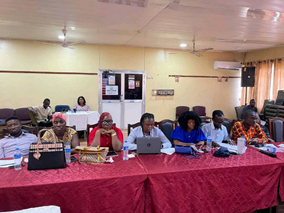In a bid to boost domestic resource mobilization and strengthen transparency and accountability in immunization and primary healthcare financing in the country, Health Alert Sierra Leone, in collaboration with WASHNet, GHAI and the Government of Sierra Leone, on Thursday 10th April 2025, concluded a one-day stakeholders’ engagement within the health sector on resource mobilization to support immunization and primary healthcare in the country.
The engagement was held at the Council of Churches Sierra Leone (CCSL) Hall, King Harman Road, Freetown.
Victor Lansana Koroma, Executive Director of Health Alert, said the meeting was aimed at engaging decision-makers on the progress made so far by the project, and the outstanding commitments, as well as reviewing key data and findings from the national immunization and primary healthcare financing analysis.
The Executive Director advocated for increased budget allocation, which is a key objective of the project, and to strengthen collaboration and coordination among health financing actors.
He further explained that they are implementing the project with support from Gavi, with funds channeled through the Global Health Advocacy Incubator (GHAI) based in the United States of America.
“This project has three objectives: to increase domestic resource mobilization at the national and sub-national levels, dedicated to primary healthcare and immunization; to improve execution of domestic funds and enable timely flow of funds to frontline workers and to ensure timely payment of COVID co-financing obligations,” he stated.
Victor Lansana Koroma said that these objectives are expected to be achieved within one to two years, depending on the impact of the budget allocation.
He highlighted that the overall goal of the project is to strengthen and create sustainable and equitable health financing that ensures comprehensive immunization coverage and robust primary healthcare services, thereby improving overall public health and reducing preventable diseases in the long term.
He further explained that the project targets five districts: Bombali, Kenema, Western Area Rural, Karene and Falaba.
During a PowerPoint presentation, Nathaniel Soloku, Project Consultant, stated that primary healthcare and immunization were the two main focus areas presented to stakeholders.
He said the presentation aimed to show how the country could shift away from donor dependency, particularly in primary healthcare and immunization interventions.
The Project Consultant underscored that the country has made notable progress in the health sector, especially in immunization over the years. He emphasized that domestic resource mobilization is essential to reduce external aid dependency, which is often unsustainable.
He noted that achieving this would require putting various mechanisms in place to ensure health financing for primary healthcare and immunization becomes sustainable.
“A lot of progress has been made in the health sector since 2002, but we still face fragile systems. We continue to see challenges like weak infrastructure, shortage of professional health workers across the country and limited rural access to health facilities,” he said.
He detailed that the country is still implementing the Free Health Care Initiative, targeting pregnant women, lactating mothers and children under five, though challenges persist, but the Ministry of Health is currently developing a new policy for it.
Nathaniel Soloku explained that domestic resource mobilization is the process by which countries raise and manage internal financial resources—including taxes, savings and revenues—to fund public services and development, thereby reducing reliance on foreign aid.
“So why does domestic resource mobilization matter to Sierra Leone? Because we want to reduce donor dependency, which is currently very high. We also want to implement tax reforms to promote sustainable financing,” he said.


He added that the financial cost of vaccine delivery focuses on expenditure, while the economic cost considers opportunity and system costs.
“For example, the financial cost of delivering vaccines is around $0.34 USD, while the economic cost, including opportunity and system costs, is approximately $0.73 USD per dose. The cost per fully immunized child is about $24.70,” he stated.
During the engagement, other key stakeholders within the health sector—including civil society actors, parliamentarians, Global Fund, Gavi, World Bank, and EPI—made commitments to work with Health Alert to support immunization and primary healthcare in Sierra Leone.